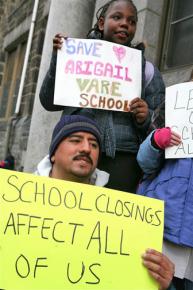Decimating Philly schools
and report on the angry protests against the drive by Philadelphia officials to attack public schools and union teachers.
HUNDREDS of parents, students, teachers and community members turned out March 7 to send a message to the city's School "Reform" Commission (SRC): We won't stand by while you gut our schools.
Some 700 people raised their voice in opposition to the city's plans to devastate local schools. Activists from community organizations such as the Philadelphia Coalition Advocating for Public Schools, Action United, Youth United for Change and the Philadelphia Teacher's Union were on hand for a rally before the meeting.
Philadelphia Federation of Teachers President Jerry Jordan and American Federation of Teachers President Randi Weingarten were among those who spoke. "Why is Wall Street doing so well when our children are struggling to get a decent education?" Weingarten demanded. "Kids have suffered cut after cut. The powers that be don't care about opportunity for children."
Weingarten was among a group of 19 activists arrested on charges of disorderly conduct before the meeting for engaging in civil disobedience by blocking the entrance to keep the meeting from happening. Meanwhile, a group of high school cheerleaders led protesters in chants of "Save our schools!" and "Fix, don't close schools!"

Very few protesters were allowed inside the building before the meeting reached its supposed capacity. Some who were able to enter were kicked out as the meeting progressed. Police refused to allow others inside. As one member of Youth United for Change put it, the commission wouldn't let protesters in because they were "afraid of people power."
Despite the angry turnout, the SRC ultimately voted to close 23 of the 29 schools that were on the chopping block. Four will remain open, and some others will consolidate or be relocated. Audience members inside the meeting reportedly wept as the commission voted to close their schools.
"I think they shot them down as if they were in a firing line," Colleen Grelis, a teacher at George W. Pepper Middle School, which was slated for closure, told the Philadelphia Daily News. "No one on the SRC has come to Pepper to see what we had. It's going to be chaos. They're just hurting kids."
PHILADELPHIA SCHOOL deformers claim that the plan to close or consolidate more than 10 percent of the city's schools is necessary to overcome what they now say is a $1.4 billion budget deficit for the next five years. "This was a difficult vote, but it focused on our goal to provide safe, high-quality seats while being fiscally responsible," SRC Chairman Pedro Ramos said in a statement after the vote.
But activists point out that the district is approving an unprecedented expansion of charter schools, using public money, even as it claims poverty. Last spring, for example, the School Reform Commission authorized the expansion of some 5,000 charter school seats--at an estimated cost of $139 million over five years.
Activists say that it is primarily African American communities and students whose schools are being targeted--and that the resulting closures will force kids into overcrowded, blighted buildings located outside their neighborhoods. J. Whyatt Mondesire, president of the Philadelphia NAACP, has said the group is considering a lawsuit to stop the closures based on the disproportionate impact on the African American community.
Speaking of the commission's decision, Randi Weingarten told the Huffington Post, "This was really a plan to eliminate public education. This is not about how to fix public schools, but to close them--not how to stabilize, but to destabilize, public schooling."
A week before the meeting, the Philadelphia School District officially opened contract negotiations by declaring war on the city's public school teachers. The city is asking teachers to increase their work day by an hour and accept a 13 percent pay cut--and then a pay freeze until 2017. Additionally, the district is demanding cuts in benefits, an end to seniority rights for assignments and transfers, and removal of class-size limits. The district even wants to eliminate necessities like drinking fountains in schools and adequate textbooks.
The Philadelphia closings plan amounts to a kind of educational "shock-and-awe" for the public school system. Such plans are being repeated in Detroit and elsewhere around the U.S. as politicians cry "poverty" in order to justify firing teachers, busting unions and turning over of huge parts of the public school system to privatizers and charter operators.
But many in attendance on March 7 were optimistic that this was not the final battle--and that the struggle for education justice will continue in Philadelphia.


